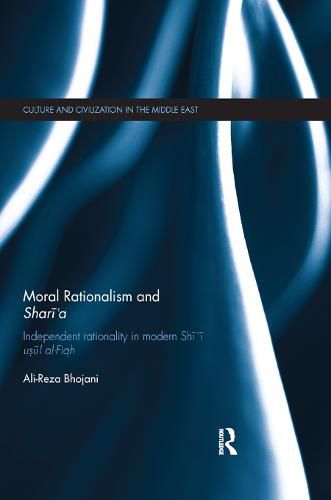Readings Newsletter
Become a Readings Member to make your shopping experience even easier.
Sign in or sign up for free!
You’re not far away from qualifying for FREE standard shipping within Australia
You’ve qualified for FREE standard shipping within Australia
The cart is loading…






Moral Rationalism and Shari'a is the first attempt at outlining the scope for a theological reading of Shari'a, based on a critical examination of why ‘Adliyya theological ethics have not significantly impacted Shi'i readings of Shari'a.
Within Shi'i works of Shari 'a legal theory (usul al-fiqh) there is a theoretical space for reason as an independent source of normativity alongside the Qur'an and the Prophetic tradition. The position holds that humans are capable of understanding moral values independently of revelation. Describing themselves as 'Adliyya (literally the people of Justice), this allows the Shi 'a, who describe themselves as 'Adiliyya (literally, the People of Justice), to attribute a substantive rational conception of justice to God, both in terms of His actions and His regulative instructions. Despite the Shi'i adoption of this moral rationalism, independent judgments of rational morality play little or no role in the actual inference of Shari 'a norms within mainstream contemporary Shi'i thought.
Through a close examination of the notion of independent rationality as a source in modern Shi'i usul al-fiqh, the obstacles preventing this moral rationalism from impacting the understanding of Shari 'a are shown to be purely epistemic. In line with the 'emic’ (insider) approach adopted, these epistemic obstacles are revisited identifying the scope for allowing a reading of Shari'a that is consistent with the fundamental moral rationalism of Shi'i thought. It is argued that judgments of rational morality, even when not definitively certain, cannot be ignored in the face of the apparent meaning of texts that are themselves also not certain. An ‘Adliyya reading of Shari'a demands that the strength of independent rational evidence be reconciled against the strength of any other apparently conflicting evidence, such that independent
$9.00 standard shipping within Australia
FREE standard shipping within Australia for orders over $100.00
Express & International shipping calculated at checkout
Moral Rationalism and Shari'a is the first attempt at outlining the scope for a theological reading of Shari'a, based on a critical examination of why ‘Adliyya theological ethics have not significantly impacted Shi'i readings of Shari'a.
Within Shi'i works of Shari 'a legal theory (usul al-fiqh) there is a theoretical space for reason as an independent source of normativity alongside the Qur'an and the Prophetic tradition. The position holds that humans are capable of understanding moral values independently of revelation. Describing themselves as 'Adliyya (literally the people of Justice), this allows the Shi 'a, who describe themselves as 'Adiliyya (literally, the People of Justice), to attribute a substantive rational conception of justice to God, both in terms of His actions and His regulative instructions. Despite the Shi'i adoption of this moral rationalism, independent judgments of rational morality play little or no role in the actual inference of Shari 'a norms within mainstream contemporary Shi'i thought.
Through a close examination of the notion of independent rationality as a source in modern Shi'i usul al-fiqh, the obstacles preventing this moral rationalism from impacting the understanding of Shari 'a are shown to be purely epistemic. In line with the 'emic’ (insider) approach adopted, these epistemic obstacles are revisited identifying the scope for allowing a reading of Shari'a that is consistent with the fundamental moral rationalism of Shi'i thought. It is argued that judgments of rational morality, even when not definitively certain, cannot be ignored in the face of the apparent meaning of texts that are themselves also not certain. An ‘Adliyya reading of Shari'a demands that the strength of independent rational evidence be reconciled against the strength of any other apparently conflicting evidence, such that independent